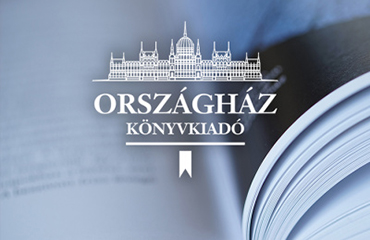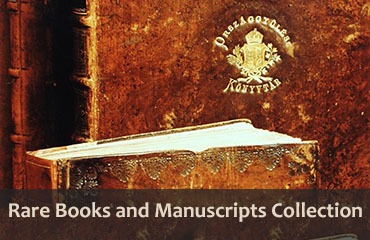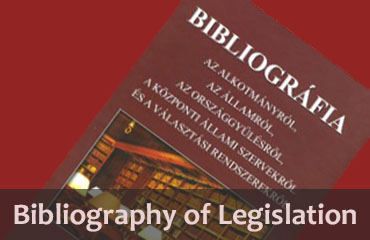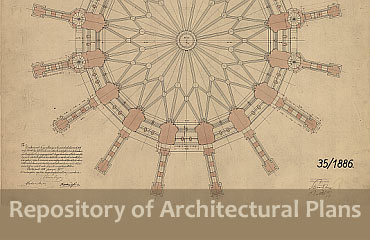This collection of the Library of the Hungarian Parliament contains approximately eight thousand works. The collection is multifarious: in addition to volumes on law, history, parliamentary and political science, there are also works on geography, economics, theology, military science and fiction, as well as richly illustrated pieces. Twenty-five of the works date from the 16th century and several legal publications from the 17th and 18th centuries: original editions of laws and decrees, and summary works on ecclesiastical, private and constitutional law as well as political and legal sciences.
Some of the historic volumes originate from the estate of Ignácz Ghyczy (1799–1870), a famous book collector and Member of Parliament from Komárom. They were donated to the Library of the House of Representatives by his heirs in 1872. The historic volumes related to the parliament entered the collection as a result of planned collecting, partly from the estate of György Gyurikovits (1780–1848), judge of the Table and ambassador to the Diet of Pozsony (now Bratislava). Our oldest volume is István Werbőczy’s Tripartitum, published in 1517. Some examples of particularly valuable volumes in the historic collection are: Bonfini’s Rerum Ungaricum, revised by János Zsámboki (1581), Ortelius’s Theatrum orbis terrarum (1595), Ferenc Nádasdi’s Mausoleum (1664) and Articles of the Diet of Ónod (1707).
Research may be conducted from Monday to Thursday from 9 a.m. to 4 p.m., and on Friday from 9 a.m. to 2 p.m.
You can send your request by filling out a request form (muzealis[at]ogyk.hu). You will be contacted by one of our colleagues the following working day.
Estates in the Libary of the Hungarian Parliament
The Ghyczy collection
The first estate donated by heirs to the Library of the House of Representatives in 1872 was the collection of Ignác Ghyczy (1799–1870), a famous book collector and member of parliament from Komárom. The 18th- and 19th-century aristocratic family library had a plephora of rare books and periodicals, as well as works on politics, law, political science, history, geography, economics, theology, military science, literary studies and fiction, mainly published in German, French, Hungarian and Latin. In 1872, this extremely valuable private collection augmented the library holdings with about 14,500 volumes.
The Gyurikovits collection
The systematic, retrospective collection of the Hungarian National Assembly’s documents began in 1894, which resulted in the discovery of the estate of György Gyurikovits (1780–1848), judge and ambassador to the Diet of Pozsony. In the early 19th century, Gyurikovits sought out, collected, purchased and copied several old parliamentary documents, thus preserving several historical sources of great value for posterity. His estate includes manuscript parliamentary sources from the period between 1608 and 1790, mainly in Latin, as well as the regularly printed minutes and papers from the period between 1790 and 1836.
The library of Ferenc Deák
The library of Ferenc Deák, who died on 29 January 1876, was offered for sale to the House of Representatives by his niece in 1913. Pál Beőthy, chairman of the House of Representatives and the library committee, mentioned this at the meeting of the committee on 20 December 1913. The library committee welcomed the offer, and “especially considering the piety which everyone has in their souls for the memory of the wise man of the country, resolves to purchase the offered Deák relics and to have them placed in an ornate cabinet in the Speaker’s reception room” (Kbiz. jkv. 20 December 1913).
The largely contemporaneous books (61 works, in 259 volumes) mostly in half-leather bindings were presented to the library on 4 February 1914. The works on political, historical, economic, public law, philosophical, legal philosophy and fictional themes were mostly in German and published in the 18th to 19th centuries. The library donated the collection of valuable works published in the 19th century to the Museum of the Hungarian Parliament, which opened in 1929. The books were placed in one of the original bookcases in the museum’s Deák Room and remained there until the closure of the institution in November 1949. Although the library was the original owner, the works were not returned to it, and their whereabouts is unknown.
The Pulszky collection
Ágost Pulszky (1846 – 1901), a former notary of the library committee, an enthusiastic patron of the library as well as an eminent lawyer and sociologist, built a rich library of the social sciences and law. In the 1930s, his library was transferred to the Széchényi Library of the Hungarian National Museum, from where it was donated to the Library of the Hungarian Parliament in 1939 due to the Pulszky’s outstanding role once played in the Library of the House of Representatives. Striving for completeness, Pulszky also collected books on the aforementioned subjects published in Hungary, but the bulk of the collection – which consisted of 1,235 works and 1,783 volumes at that time – is composed of legal, political, sociological and philosophical source material published in German, English and French-speaking countries in the second half of the 19th century.
The Thim collection
In March 1947, the library purchased a collection of 459 items between 1848 and 1930 owned by József Thim, a retired chief physician, writer and researcher of Hungarian-Yugoslav relations. A large proportion of the rare material in various Slavic languages is composed of Serbian and Croatian memoirs evoking the events of 1848, while another significant part is work dealing with Hungarian-Serbian and Hungarian-Croatian relations.
The Moór-Somló estate
In the autumn of 1977, the estate of Gyula Moór – which included the former book collection of another famous Hungarian lawyer, Somló Bódog – was donated to the Library of the Hungarian Parliament. Gyula Moór (1888–1950) was one of the greatest Hungarian legal scholars, legal philosophers and academicians, active first in Kolozsvár (now Cluj-Napoca) and then in the Hungarian capital as a university professor and MP. His work in legal philosophy was greatly influenced by Bódog Somló (1873–1920), also a notable lawyer, sociologist, legal philosopher as well as professor of legal philosophy and politics at the University of Kolozsvár, and one of the founders of the Society of Social Science. Bódog Somló inherited part of his rich collection of books on legal philosophy, sociology and economics from Gyula Kautz, a professor of national economics and former member of the library committee of the House of Representatives. He committed suicide in 1920 and his library went to one of his students, Gyula Moór, who kept it in his Budapest apartment and continued to augment it. After Moór’s death, it was preserved by another professor, Piarist Rector Sándor Sík, and after his death came into the hands of a relative of Moór. In 1977, after an exhaustive search, Dr Csaba Varga, senior research fellow at the Institute of Law of the Hungarian Academy of Sciences, found the estate of books in a garden shed in Csönge. What was left of the three scholars’ library was donated to the Library of the Hungarian Parliament. Since then, the works, bearing the Somló-Moór stamp, have been used for legal, political, sociological and philosophical research as well as in higher education in diverse ways.
Ignácz Ghyczy Exhibition Space
The Library of the Hungarian Parliament set up an exhibition space in Room 26 on the building’s ground floor with the aim of preserving the legally protected, rare and valuable volumes at the right temperature and in a way suitable for visitors. Displayed here are a part of the library’s Collection of Rare Books and Manuscripts and the diverse material of the Ignácz Ghyczy collection, inherited by the institution after the establishment of the Library of the House of Representatives.
The following parts of the collection were placed in the hall:
- special and valuable volumes from the Ignácz Ghyczy collection, selected from the warehouse of rare books and manuscripts, with attractive gilded leather binding and unique paperbacks
- selected works from Ignác Ghyczy’s agricultural collection
- rare old periodicals, mostly from the Ignácz Ghyczy collection
- the unique, historic collection of the Hungarian Parliamentary Collection dating from before 1849, including the György Gyurikovits collection
- documents of the Diet of Transylvani
- all of the large format volumes from the warehouse of rare books and manuscripts
The library’s diverse Collection of Rare Books and Manuscripts contains some 8,000 works: in addition to legal, political, parliamentary, political science and history volumes, it includes volumes on geography, economics and military science as well as literary and richly illustrated pieces.
Currently, 2,566 volumes are displayed in the exhibition space. Some of the historic volumes come from the estate of Ignácz Ghyczy (1799–1870), a famous book collector and MP from Komárom, whose heirs donated them to the Library of the House of Representatives (now the Library of the Hungarian Parliament) in 1872. The majority of the historic volumes pertaining to national assemblies come from the estate of György Gyurikovits (1780–1848), a judge of the Table and envoy to the Diet of Pozsony.
The oldest volume is over 500 years old: István Werbőczy’s Tripartitum was published in 1517. The particularly valuable volumes in the collection include Bonfini’s Rerum Ungaricum, revised by János Zsámboki (1581), Ortelius’s Theatrum orbis terrarum (1595), Ferenc Nádasdi’s Mausoleum (1664), the articles of the Diet of Ónod (1707), Sámuel Decsy’s work on the Holy Crown and the Crown Jewels (1792), and others.















